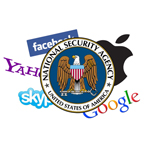
When government officials came to Silicon Valley to demand easier ways for the world’s largest internet companies to turn over user data as part of a secret surveillance program, the companies are in fear.
The National Security Agency's (NSA) PRISM is the government's program that allegedly works with major internet companies to collect citizen's data. PRISM data-mining program was launched in 2007 with approval from special federal judges.
The companies that negotiated with the government include Google, which owns YouTube; Microsoft, which owns Hotmail and Skype; Yahoo!; Facebook; AOL; Apple; and Paltalk.
Giving out others the ability to search within their servers is what tech companies tend to avoid. Tech companies have been fighting to distance themselves from the potentially privacy-violating government programs.
With PRISM, NSA allegedly have direct, real-time access to user's data on internet services provided by tech companies, anytime they want. By giving this ability, NSA will be able to pull out and see anything it likes. This includes search history, the content of emails, file transfers and live chats.
Google and Facebook were two of the most aggressive deniers. Both Google CEO Larry Page and Facebook CEO Mark Zuckerberg denied giving the government direct access to their servers.
On Friday, June 7th 2013, Google's CEO Larry Page came forward to clarify and reiterate that Google has nothing to do with the secret surveillance program PRISM. In a blog post published on that day, Page started off by saying that he wants to give users "the facts." And Zuckerberg, called press reports about PRISM "outrageous".
"First, we have not joined any program that would give the U.S. government - or any other government - direct access to our servers," Page said. "Indeed, the U.S. government does not have direct access or a 'back door' to the information stored in our data centers."
Although the two giant companies denies the government from giving out their data or user information, Google and Facebook are discussing to build separate, secure portals, like a digital version of the secure physical rooms that have existed for classified information, in some instances on company servers. Through these online rooms, the government would request data, companies would deposit it and the government would retrieve it.
These tech companies have no choice but to hand over the information when the NSA came calling. These companies were legally required to share the data under the Foreign Intelligence Surveillance Act (FISA). The tech companies also do their due diligence before handing over all of the requested information. Lawyers look over the government document before anything is handed over.
The process is by giving NSA a place to request information, and that information will be delivered into a special, secure place for them to retrieve. Once the information is in place, the NSA accesses the secure server and retrieves the requested information.
The data shared in these ways, the people said, is shared after company lawyers have reviewed the FISA request according to company practice. It is not sent automatically or in bulk, and the government does not have full access to company servers. Instead, they said, it is a more secure and efficient way to hand over the data.
Although tech companies concede that they frequently give information to the governments, tech companies have typically fought aggressively against requests they believe reach too far.
"When governments ask Facebook for data," wrote Zuckerberg, "we review each request carefully to make sure they always follow the correct processes and all applicable laws, and then only provide the information if is required by law."
Companies are legally required by FISA to hand over whatever information the government asks for under the law, But they are not required to make it easier for the government to get that information. This, however, appears to be what they've planned to do.
Google, Microsoft and Twitter publish transparency reports detailing government requests for information, but these reports do not include FISA requests because they are not allowed to acknowledge them. Statements from Yahoo!, Apple, AOL and Paltalk made the same distinction.